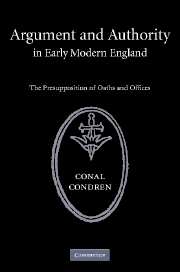Book contents
- Frontmatter
- Contents
- Preface
- Introduction
- Part I The liquid empire of office
- Part II The authority and insolence of office
- 7 The cases of patriot and counsellor
- 8 Casuistry as the mediation of office
- 9 The case of resistance to superior power
- 10 Metaphor and political autonomy
- Part III ‘I, A. B.’
- Epilogue
- Bibliography
- Index
8 - Casuistry as the mediation of office
from Part II - The authority and insolence of office
Published online by Cambridge University Press: 28 October 2009
- Frontmatter
- Contents
- Preface
- Introduction
- Part I The liquid empire of office
- Part II The authority and insolence of office
- 7 The cases of patriot and counsellor
- 8 Casuistry as the mediation of office
- 9 The case of resistance to superior power
- 10 Metaphor and political autonomy
- Part III ‘I, A. B.’
- Epilogue
- Bibliography
- Index
Summary
And not rather, (as we have been slanderously reported, and as some affirm that we say,) Let us do evil that good may come? Whose damnation is just.
(Romans 3: 8)Like the proverbial Jesuit in a black cloak, casuistry has for long enough been hovering at the edge of this study. It now warrants elaboration. And, a little like the shape-shifting Jesuit of myth, casuistry was, and remains, too complex a phenomenon to be seen as any single school, or doctrine of moral reasoning. It was, rather, a constellation of propensities sharing the recognition that principles under-determine conduct. Even if the conscience was furnished with perfect knowledge of the principles of proper conduct, they still needed applying in situations that might qualify their authority. Of dress codes and sumptuary laws, wrote Donne, what may approach sin under some circumstances, is ‘not alwais, nor everywhere’. He was bolder about the prohibition on suicide. ‘No law is so primary and simple, but it fore-imagines a Reason upon which it was founded: And scarce any Reason is so constant, but that Circumstances alter it.’ Such a casuistic insistence on the ethical necessity of a principle of specific judgement had long been prop to the priestly office regardless of Reformation divisions, but was vital as a moral move well beyond pastoral care and the confessional.
- Type
- Chapter
- Information
- Argument and Authority in Early Modern EnglandThe Presupposition of Oaths and Offices, pp. 172 - 185Publisher: Cambridge University PressPrint publication year: 2006

